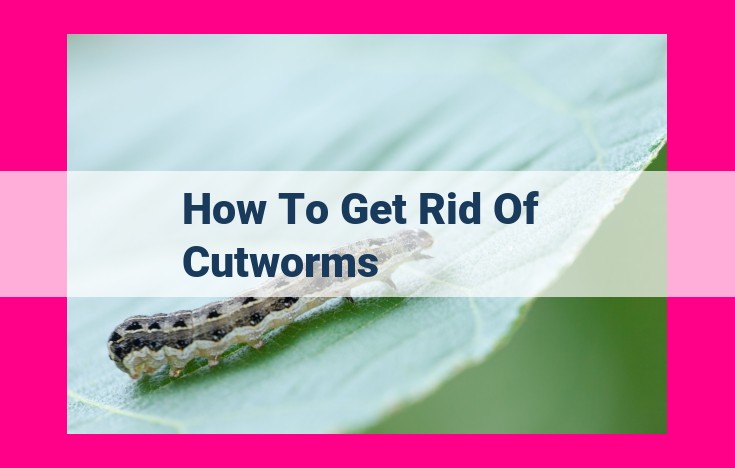Eliminate Cutworms Naturally: A Comprehensive Guide To Garden Pest Control

Cutworms are a common garden pest that can devastate young plants. To eliminate cutworms naturally, encourage beneficial predators such as ground beetles, birds, and toads. Consider using biological control agents like nematodes, which kill cutworms. Other measures include maintaining a clean garden by removing weeds and debris, encouraging beneficial insect populations, and inspecting plants regularly. Implementing these methods can effectively control cutworms without resorting to harmful chemicals.
Natural Predators: The Sentinels of Your Garden
Nature has its own arsenal of warriors against pests that plague our gardens. From the tiny ground beetles that patrol the soil to the soaring birds that swoop from the sky, these beneficial predators are our natural allies in the fight against garden foes.
Ground Beetles: The Stealthy Sentinels of the Soil
Stealthily traversing the earth, ground beetles are fierce hunters that seek out and devour a variety of pests, including slugs, snails, and larvae. These nocturnal predators hide under stones and fallen leaves during the day, emerging at night to feast on their unsuspecting prey.
Birds: Aerial Defenders of the Canopy
Soaring above the garden, birds are ever-watchful for insects that dare to breach their aerial domain. Sparrows, bluebirds, and wrens are masters of maneuver, deftly snatching up aphids, caterpillars, and other flying pests before they can inflict damage on our precious plants.
Toads: Patient Sentinels of the Ponds
In the still waters of garden ponds, toads lurk with patience, waiting for unsuspecting pests to venture too close. Their long, sticky tongues are lightning-fast, capturing snails, slugs, and insects with remarkable accuracy.
Parasitoid Wasps: The Microscopic Assassins
Invisible to our eyes but deadly to certain pests, parasitoid wasps are the masters of biological warfare. These tiny insects lay their eggs inside or on the bodies of unsuspecting pests, where their developing larvae hatch and feed on their hosts from the inside out.
Biological Control: A Natural Solution for Pest Management
In the world of gardening, pests are a constant challenge. From aphids to caterpillars, these uninvited guests can wreak havoc on our beloved plants. But what if there was a way to control them without relying on harmful chemicals?
Enter biological control. This eco-friendly approach harnesses the power of nature’s own pest-fighting forces, such as nematodes and beneficial insects. These organisms are natural predators that attack and suppress pests without leaving behind any toxic residue.
Nematodes, microscopic roundworms, have a voracious appetite for pests like grubs, root weevils, and maggots. They enter the soil and actively seek out their prey, injecting them with a deadly bacteria that dissolves their internal organs.
Beneficial insects, such as ladybugs, lacewings, and parasitic wasps, also play a crucial role in biological control. Ladybugs, for example, feed on aphids, while lacewings devour a wide range of soft-bodied pests. Parasitic wasps, on the other hand, lay their eggs inside the bodies of pests, effectively stopping them from reproducing.
The beauty of biological control lies in its selectivity. These organisms target specific pests while leaving beneficial insects unharmed. This preserves the delicate balance of the ecosystem and allows us to enjoy a pest-free garden without disrupting the natural food chain.
How to Implement Biological Control
Incorporating biological control into your pest management strategy is relatively simple. Here are a few tips to get you started:
- Identify the pests you’re dealing with. Different beneficial insects target different pests, so it’s important to know your enemy before you release the cavalry.
- Purchase beneficial insects or nematodes from a reputable supplier. Release them at the appropriate time and location.
- Encourage beneficial insect populations by providing them with food sources and shelter. Plant nectar-producing flowers and avoid using pesticides that can harm them.
- Monitor your plants regularly for signs of pests and beneficial insects. This will help you fine-tune your biological control efforts over time.
By embracing biological control, you can create a thriving garden that’s both beautiful and free from pests. Join the growing number of gardeners who are discovering the benefits of this natural, effective, and sustainable pest management solution.
Other Natural Pest Control Measures
In addition to introducing natural predators and utilizing biological control, there are several other effective measures you can implement to discourage pests in your garden naturally.
Encouraging Beneficial Insect Populations
Provide food and shelter: Create a welcoming habitat for beneficial insects by planting a variety of flowers that provide nectar and pollen. Consider adding a water source, such as a birdbath or small pond, to attract pollinators. Providing nesting boxes or insect hotels encourages beneficial insects to stay in your garden and prey on pests.
Companion Planting
Botanical synergy: Companion planting involves growing specific plants together to create a mutually beneficial environment. Many plants emit scents that repel pests, while others attract beneficial insects that prey on them. For example, planting marigolds near tomatoes can deter aphids, while planting garlic alongside roses can repel spider mites. By carefully selecting compatible plants, you can create a natural pest control system.
Avoiding Overwatering
Moisture management: Excessive watering can lead to waterlogged soil, which promotes rot and attracts pests that thrive in damp conditions. Allow the soil to dry out slightly between waterings to create an unfavorable environment for pests. Overwatering can also weaken plants, making them more susceptible to pests and diseases.
Removing Weeds and Debris
Cleanliness matters: Remove weeds and debris from your garden regularly to eliminate hiding places for pests and prevent the spread of diseases. Weeds can compete with your plants for water and nutrients, while piles of leaves or compost can provide shelter for insects and slugs. By keeping your garden clean, you discourage pests from taking up residence.
Regular Plant Inspections
Early detection: Inspect your plants regularly for any signs of infestation, such as chewed leaves, discoloration, or wilting. Early detection allows you to take prompt action and prevent pest populations from escalating. By addressing problems quickly, you can minimize damage to your plants and maintain a healthy, pest-free garden.